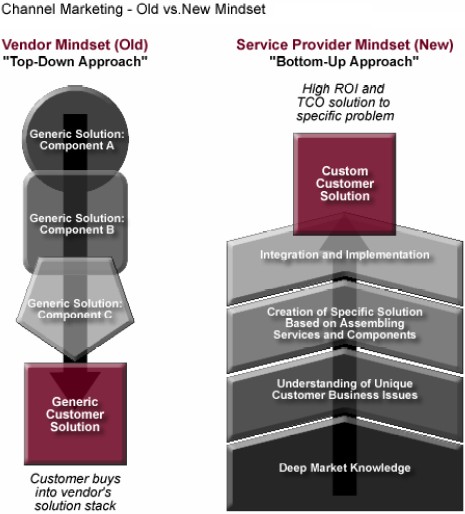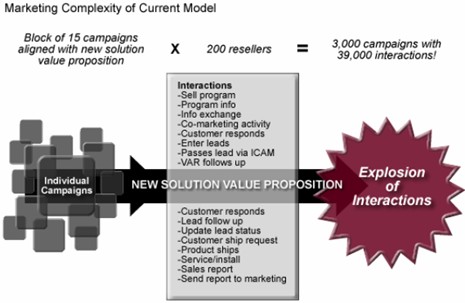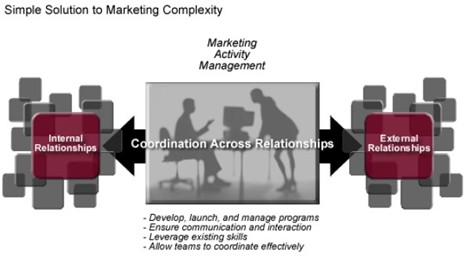Changes in the way customers buy technology are stressing existing vendor channel and partner organizations, processes, and capabilities. As a result, companies need to rethink the ways they allocate their channel marketing resources and how they use marketing infrastructure to scale their channel operations, particularly as they target the SMB market.
The Rise of Solutions
Once upon a time, we lived in a product-driven world. Sales involved promoting the newest product and the latest bells and whistles.
Today, customers want solutions to business problems. As VARs and other channel partners evolve into providers of end-to-end solutions, vendors are also forced to adapt how they do business.
Best-in-class VARs and other channel partners start with a deep understanding of their specific target market. They identify the customer's business issues and develop an approach to addressing those issues. The next step is to assemble the necessary "piece parts" from vendors and package them into a solution that includes the VAR's or channel partner's services.
This is opposed to a typical vendor approach that sees the universe in terms of the vendor's own technology stack. From this perspective, the goal is to get customers to buy into the vendor's technology vision.

Instead of "pushing" programs from the top down through the channel, companies need to build programs from the ground up cooperatively with VARs and other channel partners. Many companies have been doing this for a long time with large enterprise partners. Now these changes are percolating throughout the partner landscape and into the SMB space to include VARs, distributors, and other channel partners.
At every stage, vendors work must work actively with resellers to assemble solutions and articulate customer value in terms of the latest industry and channel business models.
A New Paradigm: Channel Value Engineering
We call this new paradigm "channel value engineering." Value engineering is a new model for assembling solutions and articulating customer value in terms of the latest industry and channel business models.
In channel value engineering, vendors format their channel programs to allow channel partners to pick the solution's technology components based on how well the vendor's solution resonates with the partners' solutions and business models.
Vendors benefit from this approach because it takes the focus off "laundry lists" of features and the prices of individual components. Instead, channel partners are looking at a vendor's core competency, value-proposition to the customer, and key messages in the context of their overall solution delivery model to the end user.
By replacing scatter-shot marketing programs, value engineering processes increase returns on vendor marketing investments by helping partners harmonize messages and activities for increased effectiveness and faster revenues—leading to partner and vendor success.
Strategy Is Great, but You Have to Translate It Into Action
Understanding the channel value engineering strategy is an important first step. But it's just an exciting idea until you get some concrete value from it by putting it into action. The first step in executing value engineering is basing programs and associated marketing campaigns on underlying co-marketing principles.
Once you start selling cooperatively, you will naturally have more partner relationships, many more product/solution combinations, and multiple associated marketing programs. But, to scale, vendors need to develop processes and operational models based on repeatability and reusability. Companies need processes that foster flexibility and agility, and tools that simplify execution; in short, vendors need to create a mass-customization machine for channel co-marketing, especially for the SMB market space.
Undertaking such an effort forces businesses to change internal processes and organizational structures. After these changes have been mapped out, implementation requires a toolkit that lets vendors scale to meet much more complex and constantly changing channel relationships.
The Right Combination of New Business Processes and Supporting Tools Enable You to Scale Effectively
Say you want to push a block of 15 campaigns aligned with a new solution value proposition through 200 resellers. Currently, this is what you would get: Yes, that's 3,000 individual programs—clearly an impossible task.

Just as clearly, you need a way to scale your programs that doesn't overwhelm your organization and your workload.
A highly efficient and repeatable set of processes is needed for developing, launching, and managing programs and their associated campaigns. And you need more than just process changes.
Management tools are also needed to ensure communication and interaction among teams, organizations and associated systems.

These updated processes and tools leverage your staff's skills and allow teams to coordinate effectively across both internal and external relationships. It's an approach that enables large-scale programs, saves time, reduces costs, and increases market reach.
Once the process is in place, you need software tools that support the methodology. We refer to these as marketing activity management (MAM) tools. MAM tools "walk" teams, and the external partners they work with, through each step of the program or campaign development process. MAM tools help systematize marketing campaigns, facilitating interactions and ensuring consistency and repeatability—across programs, contributors and organizations.
Providing methodology and software tools, an MAM system helps vendors to...
- Capture organization structure and processes
- Launch campaigns
- Assign and monitor tasks
- Measure progress
- Manage the extended relationships involved in delivery
- And implement all the above on a large scale
The MAM system builds a foundation of consistent and repeatable, and reusable, processes that can be used time and time again to roll out campaigns. This leverages vendor staff and resources to deliver more effective programs, more efficiently.
Customers win because implementations deliver value faster when everyone's singing from the same book. Resellers win because they are positioned in the minds of customers to close profitable business. And vendors win because marketing campaigns built around these models pave the way to higher channel uptake for vendor programs.
We all know that form follows function. As vendors adapt to today's focus on end-to-end solution delivery, they need to reshape their marketing processes and infrastructure to the new model.
Marketing Activity Management systems combine both the methodology to implement the new model successfully and the tools to streamline the workload. As a result, vendors are finally able to scale, creating channel marketing organizations that deliver the promise of Mass-Customization, which is essential to creating a scalable SMB go-to-market strategy.



